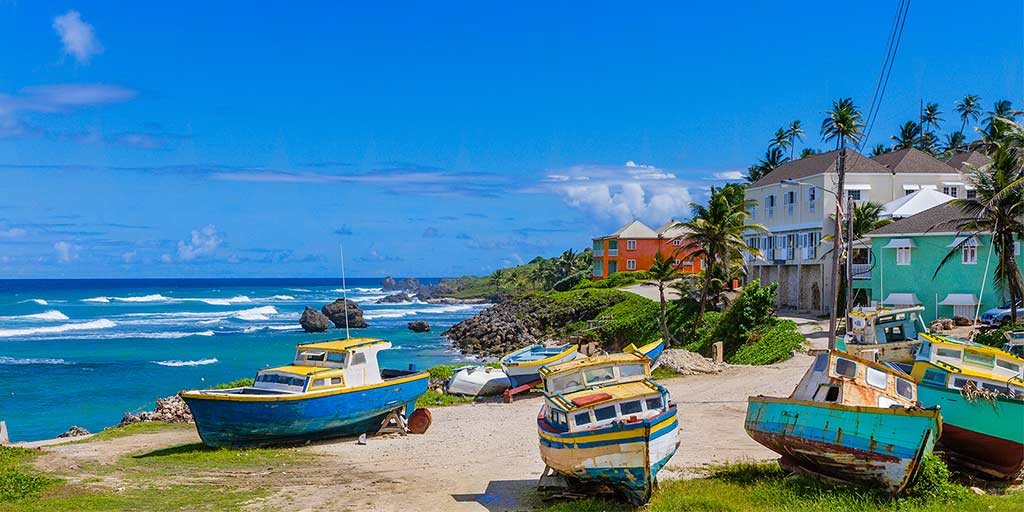While most trips to Barbados are likely to be without issues, it’s important to note that this island destination typically maintains a lower crime rate compared to other Caribbean countries. Nonetheless, it’s not completely free of risks. Notably, since 2019, there has been a rise in gun-related crimes associated with gangs. These incidents include robberies, shootings, and instances of sexual assault, even in crowded and commonly frequented areas.
Here are a couple of factors to consider for maintaining awareness during your vacation.

Crime in Barbados?
he U.S. Department of State strongly recommends that its citizens avoid specific areas: Crab Hill at all times, Nelson and Wellington streets in Bridgetown at night. Additionally, caution is advised when participating in non-reputable nighttime party cruises.
Based on the OSAC’s 2020 Crime and Safety Report for Barbados, the country reported 490 drug-related crimes, 325 residential burglaries, and 44 vehicle thefts per 100,000 citizens in 2018. Despite overall visits being relatively trouble-free, tourists are most susceptible to minor crimes and opportunistic offenses.
Street vendors selling goods on the island are not notably more bothersome than those in other Caribbean or Mexican destinations. However, it’s wise to anticipate some persistent solicitation.
Particular care is advised, especially at night, when in St. Lawrence Gap, situated along the southern coast of the island.
While driving, it’s recommended not to stop if flagged down and to keep car doors locked.
Travel safety tips for women in Barbados
It is advisable for women to travel together and avoid walking alone during nighttime. As indicated by multiple visitor reports on TripAdvisor from 2017, female travelers should remain vigilant against instances of harassment while walking along streets, beaches, and specifically in areas like St. Lawrence Gap (The Gap). This harassment might involve local men making inappropriate comments and occasionally even following female tourists.
In 2017, disturbing incidents occurred involving female British tourists in Barbados. One was subjected to rape at Holetown Beach, while another encountered an attempted rape while jogging near her holiday apartment in Holetown. Regrettably, the latter victim expressed dissatisfaction with the local police response to her complaint.
To ensure safety, it’s crucial to exclusively utilize licensed taxis and settle on a fare in the local currency before beginning your journey, as taxis typically do not have meters. Avoid carrying substantial amounts of cash or wearing excessive jewelry to mitigate risk.
Barbados Nightlife
Based on visitor feedback from 2017 on TripAdvisor, it’s worth noting that The Gap can be a location where potential issues might arise. Several reports point out that during nighttime, this strip consisting of restaurants, bars, and nightclubs can attract individuals engaging in solicitation, including offering illegal drugs, as well as beggars who might persistently request money. Some accounts also highlight that specific parts of The Gap appear rundown and inadequately illuminated at night, potentially lacking a family-friendly atmosphere. A TripAdvisor user also mentioned that certain taxi drivers at The Gap can exhibit aggressive behavior and overcharge.
When spending time in this area, exercising caution is recommended, especially if walking alone at night or using ATMs to withdraw money.
Hurricanes and natural disasters in Barbados
Compared to other Caribbean islands, Barbados faces a relatively lower risk of natural disasters. While it experiences the hurricane season spanning from June to November, it has not encountered significant destruction since the impact of Tropical Storm Tomas in 2010. In 2017, Hurricane Harvey made landfall as a storm, resulting in power outages and notable damage along its trajectory.
Additionally, Barbados is susceptible to landslides, primarily affecting the Scotland district situated in the northeastern part of the island.
Health risks in Barbados
When considering significant illnesses, it’s important to be cautious about dengue fever, Zika virus, and Chikungunya fever. These viruses are transmitted by infected mosquitoes. To minimize the risk of mosquito bites, it’s advisable to use effective insect repellent and opt for clothing that covers your arms and legs.
According to the CIA’s World Factbook, the estimated adult prevalence rate of HIV/AIDS infection was 1.3% in 2016, with approximately 2,600 individuals living with the virus in Barbados.
It’s worth taking seriously the advice about the potential hazard of falling coconuts in Barbados. Walking beneath coconut-bearing trees requires mindfulness, and attempting to climb such trees to retrieve coconuts should be avoided.
Culture in Barbados
By and large, Barbadians are known for their friendliness and courtesy. Alongside the well-recognized holidays, the island also observes Crop Over in July and August, a major celebration featuring food, street parades, and soca music.
Nonetheless, there are certain etiquette guidelines to bear in mind while visiting this Caribbean nation:
- When at the beach, it’s important to wear appropriate swimwear; public nudity, including going topless or bottomless, is illegal.
- Refrain from wearing clothing featuring camouflage print, as this is prohibited by law and reserved for the military.
- It’s crucial to note that Barbados maintains very conservative views regarding same-sex relationships, and such relationships are against the law.






